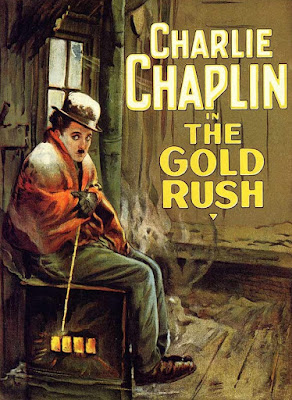The Gold Rush
Humility and honesty triumph over everything else Luis Pinzolas
The Gold Rush, starring Charles Chaplin, was one of the first silent films by the renowned comedy and drama actor which made a massive impression on me as a child. One of the scenes that enthused me at the time was when they are in an isolated cabin in the snow, sharing a boot cooked in water as their only food. One of the characteristics of this remarkable actor, and which is amazing due to its simplicity, is his special knack for expressing the feelings that he wants to transmit to the public through expressions on his face, sometimes with a look capable of showing sadness or at other times expressing joy.
Likewise, the way he walks (it reminds me of a duck) with his cane makes the audience laugh loudly whenever he trips or slips.
Almost all the scenes in the film are a pure mockery of him and the other characters can make fun of him in any situation because of his clothing, as well as when he implies that he is in love with the female protagonist. In addition, she and her companions from the bar where they work as dance partners make even more fun of him. In the end he becomes rich but still maintains humble attitude, only seeking happiness on the ship which he takes to return to his country.
I urge anyone who reads this article about Charles Chaplin to see his films and to remember with nostalgia this great actor who starred in many great silent movies.

Seven Brides for Seven Brothers
«He is out plowing, he had his breakfast over half an hour ago. I got hot muffins waiting, crisp bacon, steak, fried potatoes, fresh ground coffee. No do I get that winter underwear or do I have to come in and take it off you?»Moises Sánchez (Inglés 3)
La película “Siete novias para siete hermanos”, que he vuelto a ver después de muchos años, me sigue gustando en todos los aspectos y ahora he encontrado que el tema que trata de fondo está totalmente de actualidad; y es el tema del machismo, aunque en la película está disimulado al enfocarlo desde el punto de vista de unos hombres rudos que viven en los bosques y, para los cuales, la mujer está solo para cuidar de la casa, hacer la comida y estar a su disposición cuando les apetezca.La película demuestra que cuando una mujer se planta un poco y les hace frente, como hace Milly, descubre que no son tan malos, sino que hacen lo que han visto siempre. Esta mujer, por un lado con mano dura y, por otro con sensibilidad, demuestra que no es tan fiero el león, sino que sólo hace falta saber tratar a las personas.
Ella demuestra en la cita que no duda en amenazarlos, que si no se quitan la ropa interior sucia, ella misma va a entrar a quitársela, y, de paso les ofrece desayunar como su hermano mayor, Adam.
Jane Eyre
“The shadows are as important as the lights”Olivia Morales
Based on Charlotte Brönte’s book “Jane Eyre”, my favourite version of this film is the one directed by Zefirelli, for its artistic quality and the magnificent performance of Charlotte Gainsbourg in the role of Jane and William Hurt as Mr. Rochester. This film is set at the beginning of the XIX century in England, and narrates the life of a young English girl. Despite being an orphan, she is intelligent, rebellious and good-natured, having spent a tough childhood at the household of an aunt who hates her, and later educated in a harsh boarding school for poor girls. She becomes a teacher living there and ends up leaving as a governess when she is hired to educate a girl called “Adele” who is adopted by Mr. Rochester, the rich owner of an old, majestic mansion which hides a painful and terrible secret.
The phrase from the film which made the greatest impact on me was the one said by Jane to Adele, as she taught her to draw: “The shadows are as important as the lights”, explaining to her pupil a comparison of how we must understand and accept the behaviour and inner-world of people.
Los Santos Inocentes
—¡Milana bonita, Milana bonita! ¡No tire señorito! ¡Es la Milana!Marie-France Nottet
I have chosen this film because I experienced a similar situation in the 70s, although a less dramatic one. At that time, I was working as an au pair for a family of Spanish dukes. They had a huge farm with several guards in Toledo for hunting. (Some of the employees lived in a precarious situation in a tiny hut similar to Paco and Regula’s.) The timeless theme of the film is “human dignity”. It is a rural drama that brings us closer to the lives of 2 families: the servants (Paco, Regula, their 3 children and the retarded brother-in-law) and the masters (Master Ivan and his family). The viewer is shown the awful relationship that exists between Iván and Paco, which shows an example of Hegel’s master and slave dialectic. The humiliation to which Iván submits Paco provokes our repulsion and when the play ends as a result of the murder of Master Iván by Azarías, the viewer cannot help but applaud this gesture and interpret it as an act of justice...


No hay comentarios:
Publicar un comentario